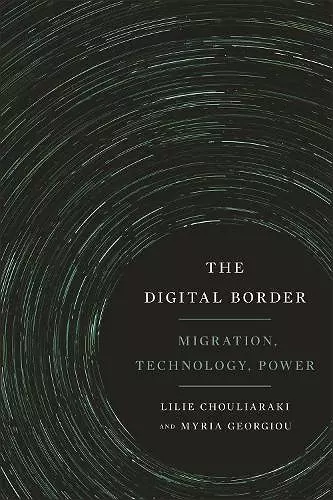The Digital Border
Migration, Technology, Power
Lilie Chouliaraki author Myria Georgiou author
Format:Paperback
Publisher:New York University Press
Published:21st Jun '22
Should be back in stock very soon

How do digital technologies shape the experiences and meanings of migration?
As the numbers of people fleeing war, poverty, and environmental disaster reach unprecedented levels worldwide, states also step up their mechanisms of border control. In this, they rely on digital technologies, big data, artificial intelligence, social media platforms, and institutional journalism to manage not only the flow of people at crossing-points, but also the flow of stories and images of human mobility that circulate among their publics.
What is the role of digital technologies is shaping migration today? How do digital infrastructures, platforms, and institutions control the flow of people at the border? And how do they also control the public narratives of migration as a "crisis"? Finally, how do migrants themselves use these same platforms to speak back and make themselves heard in the face of hardship and hostility?
Taking their case studies from the biggest migration event of the twenty-first century in the West, the 2015 European migration "crisis" and its aftermath up to 2020, Lilie Chouliaraki and Myria Georgiou offer a holistic account of the digital border as an expansive assemblage of technological infrastructures (from surveillance cameras to smartphones) and media imaginaries (stories, images, social media posts) to tell the story of migration as it unfolds in Europe's outer islands as much as its most vibrant cities.
This is a story of exclusion, marginalization, and violence, but also of care, conviviality, and solidarity. Through it, the border emerges neither as strictly digital nor as totally controlling. Rather, the authors argue, the digital border is both digital and pre-digital; datafied and embodied; automated and self-reflexive; undercut by competing emotions, desires, and judgments; and traversed by fluid and fragile social relationships—relationships that entail both the despair of inhumanity and the promise of a better future.
"
In a provocative contribution, Chouliaraki and Georgiou illuminate the exclusionary workings
of digital borders. This broad-ranging book launches a compelling critique of the constitutive
power of digital infrastructures in shaping the crisis of migration. Timely and topical, The Digital
Border will be essential reading across disciplines about transformations in border regimes.
Provides a striking critical analysis of the mutations and workings of border regimes. While its
focus is the digitalization of border control, it more broadly places its analysis within an
understanding of the border as a field of tensions, shedding light on its territorial and symbolic
dimension as well as on the multiple regimes of securitization at work today.
ISBN: 9781479873401
Dimensions: unknown
Weight: 340g
256 pages